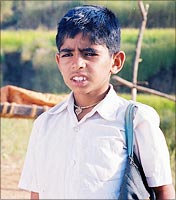The Marathi film industry is on a roll with three major hits in six months.
The film that started the gold rush is Ankush Chaudhari's Sade Made Teen. This remake of Kishore Kumar's Chalti Ka Naam Gaadi made erstwhile reluctant multiplexes open their doors to Marathi films. Released in November, the film is still doing well in rural centres and has crossed the magic figure of Rs 4 crores -- a major achievement for a Marathi film.
Valu, 2008's first major Marathi hit, followed. The film, which takes a refreshing look at village life was released in February and is still going strong in Mumbai, Pune and some towns. According to debutant director, Umesh Kulkarni, the film has officially grossed Rs 3 crores.
The newest Marathi hit is Tingya, a touching film by first-time director Mangesh Hadwale, which opened to packed theatres last Friday. Already a winner of numerous national and international awards -- 18 so far -- the film is all set to be screened at the Cannes Film Festival.
But all this wouldn't have been possible if not for the business acumen of Sadik Chitalikar, the man responsible for distributing the films. Known among the Marathi film industry for his no-nonsense attitude and business sense, Sadik said the success of these films have given Marathi films a much-needed boost.

There are those like Ganesh Gargote, Marathi film analyst and film buff, who point out that the success of these films have much to do with the fact that they have been produced and presented by corporate houses -- Sade Made Teen was presented by Zee Telefilms, Valu was produced by Subhash Ghai's Mukta Arts and Tingya by One More Thought Entertainment.
Chaudhari, however, feels that Sade Made Teen created history because of the story's appeal and the coming together of three popular Marathi actors -- Ashok Saraf, Bharat Jadhav and Makrand Anaspure.
Similarly, Umesh Kulkarni, director of Valu, credited his film's popularity to its different look at rural life.
The media too has played a part in bringing the audience to the theatres. Big promotional activities at the rural level have created awareness about these films. Plus, word of mouth has also helped.
This is a clear sign that a fresh wind of change is blowing in the industry. If this pattern continues, we might see some very good Marathi cinema in future.





